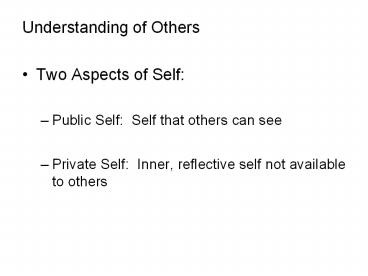Understanding%20of%20Others PowerPoint PPT Presentation
Title: Understanding%20of%20Others
1
- Understanding of Others
- Two Aspects of Self
- Public Self Self that others can see
- Private Self Inner, reflective self not
available to others
2
- Why is understanding the distinction between the
public and private self important? - Awareness of private self implies an awareness of
mental states such as desires and beliefs that - Are not accessible to others
- Guide behavior
- Awareness of these mental states is critical for
understanding others - If you dont understand that others have mental
states that guide their behavior, it is difficult
to understand or predict their behavior
3
- As adults, we use our knowledge of mental states
to understand human behavior - Ex Why did Jimmy go to Billys house?
- Desires (He wanted to play with Billy)
- Beliefs (He thought Billy was at home)
- We assume that mental states such as desires and
beliefs motivate action (behavior)
4
- These mental states are invisible
- Cant see a belief or a desire (or other mental
states like intentions, feelings, etc.) - So how do children develop an understanding of
these invisible states and their influence on
action?
5
- Development of a Theory of Mind
- Between 2 and 5 years, children construct a
theory of mind (TOM) - Theory of Mind
- A basic understanding of how the mind works and
how it influences behavior - Ex Desires and beliefs produce actions
6
- Between about 2 and 3 years, children
- Talk about mental states (e.g., feelings,
desires) - Understand that desires can influence actions
- Dont fully understand how beliefs can influence
actions - Seem to treat beliefs as accurate views of
reality that everyone shares - Do not understand that a person may act on a
belief that is inaccurate
7
- False Belief Tasks
- Test a childs understanding that another
persons behavior will be based on that persons
belief, even if the belief is inaccurate - 3-year-olds typically fail false belief tasks
- By age 5, children pass false belief tasks
8
- Exceptions
- Children with autism have great difficulty with
false belief (and other similar) tasks - Congenitally deaf children of hearing parents
(late signers) also have difficulty with false
belief tasks
9
- What Factors Influence TOM Development?
- Biological factors
- TOM as a product of evolution
- Adaptive to understand mental states such as
beliefs and desiresmakes it possible to
understand and predict others behavior - TOM module Brain mechanism that makes it
possible for children to acquire a theory of mind
10
- Social interaction is likely to contribute to the
development of a TOM - Pretend play Pretending to be someone one is
not or pretending that an object is something
else may foster understanding that beliefs may
not always reflect reality - Discussions with others about mental states such
as desires, beliefs, etc. - Mothers who talk more about mental states with
young children have children who perform better
on false belief tasks
11
- Late signers and autistic children may show delay
in TOM development in part because of restricted
access to social interaction (Peterson)
12
- Evidence that late signing and autistic children
do better on TOM tasks involving pictures - Petersons study
- Late signers and autistic children performed
better on false drawing tasks than typical
preschool age children - Preschool age children performed better on false
belief tasks than late signers and autistic
children

